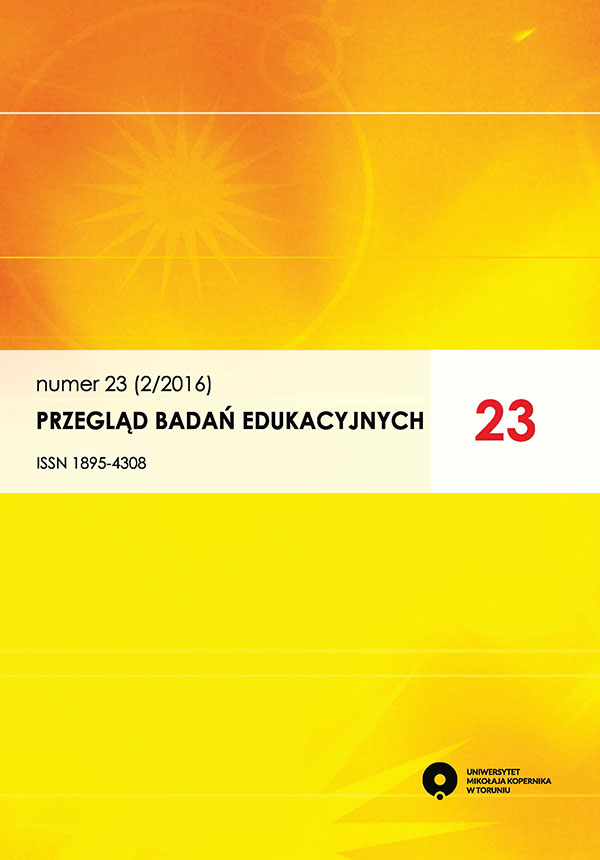Reconstructive Research – Beyond the Subjectivity and Objectivity of Interpretation. Based on an Example of Analysis of Difficult Situations in Professional Work in the Experience of Pedagogy Graduates
DOI:
https://doi.org/10.12775/PBE.2016.080Keywords
pedagogy, qualitative research, reconstructive research, objective hermeneutics, pedagogy graduateAbstract
This article is of methodological form, i.e. the descriptions of difficult situations encountered by pedagogy graduates in their professional work and reported by them to the researcher in semi-structured interviews, are treated as illustrative empirical data submitted to analysis (themanner of analysis is more important than its subject). The analysis is conducted according to the guidelines and principles of objective hermeneutics. It consists in the reconstruction of intersubjectively understood (in this way objective) structures of meaning and sense, what allows to reconstruct more visibly the pattern of actions of a responding person. In the article the reconstruction of fragments of two pedagogy graduates’ statements is presented. It is preceded by a consideration of subjectivity – objectivity issue in empirical research as the features of data and the conduct of the researcher. Unlike in classical frameworks where these features are usually presented in opposition to each other, in the method of objective
hermeneutics the objectivity (understood as intersubjectivity) is a condition for subjectivity, whereas subjectivity (individuality) is a condition for the change of existing structures.
References
Bora A., Dresel T., Sutter T., Weisenbacher U. (1991), Die Methode der Sozialisation. Eine Fallanalyse zum Zusammenhang von Konstitution und Rekonstruktion der Moral, w: D. Garz, K. Kraimer (red.), Qualitativ-empirische Sozialforschung, Westdeutscher Verlag, Opladen
Flick U. (2002), Qualitative Sozialforschung, Eine Einführung, Rowolts Taschenbuch Verlag Reinberg beim Hamburg
Flick U. (2011), Jakość w badaniach jakościowych, WN PWN, Warszawa.
Granosik M. (2006), Profesjonalny wymiar pracy socjalnej, Śląsk, Katowice.
Lalak. D. (2010), Życie jako biografia. Podejście biograficzne w perspektywie pedagogicznej, Żak, Warszawa
Michalski G. (2004), Źródła do badań biograficznych w historii wychowania, w: T. Jałmużna, I. Michalska, G. Michalski (red.), Konteksty i metody w badaniach historyczno-pedagogicznych, Impuls, Kraków
Nagel U. (1998), Sozialpädagogische Forschung und rekonstruktive Theoriebildung, w: T. Rauschenbach, W. Thole (red.). Sozialpädagogische Forschung. Gegenstand und Funktionen, Bereiche und Methoden, Juventa Weinheim i München.
Oevermann U. (1991), Genetischer Strukturalismus und das sozialwissenschaftliche Problem der Erklärung der Entstehung des Neuen, w: S. Müller-Doohm (red.), Jenseits der Utopie, Suhrkamp, Frankfurt am Main.
Oevermann U. (1996), Theoretische Skizze einer revidierten Theorie professionalisierten Handels, w: Combe A., Helsper W. (red.) Pädagogische Professionalität. Untersuchungen zum Typus pädagogischen Handels, Suhrkamp, Frankfurt am Main.
Oevermann U. (2000), Die Methode der Fallrekonstruktion in der Grundlagenforschung sowie der klinischen und pädagogischen Praxis, w: K. Kraimer (red.), Die Fallrekonstruktion, Suhrkamp, Frankfurt am Main.
Oevermann U. (2002), Klinische Soziologie auf der Basis der Methodologie der objektiven Hermeneutik – Manifest der objektiv hermeneutischen Sozialforschung, www.ihsk.de/publikationen/Urlich_Oevermann-Manifest_der_objektiv_hermeneutischen_ Sozialforschung.pdf, dostęp: 17.09.2007.
Oevermann U., Allert T., Konau E., Krambeck J. (1979), Die Methodologie einer „objektiven Hermeneutik“ und ihre allgemeine forschungslogische Bedeutung in der Sozialwissenschaften, w: H.G. Soeffner (red.). Interpretative Verfahren in den Sozial- und Textwissenschaften, Metzler, Stuttgart.
Schmidt K.J., Modrzejewska-Świgulska M. (2014), Metody zbierania i analizy danych w badaniach edukacyjnych. Walidacja komunikacyjna w analizie wyników badań pedagogicznych, „Przegląd Badań Edukacyjnych”, nr 19.
Schütz A. (2006), Potoczna i naukowa interpretacja ludzkiego działania, (rozdz. 13), w: A. Jasińska-Kania i in. (red.) Współczesne teorie socjologiczne, WN Scholar, Warszawa.
Schütze F. (1992), Sozialarbeit als „bescheidene“ Profession, w: B. Dewe, W. Ferchoff, F.-O. Radtke (red.), Erziehen als Profession. Zur Logik professionellen Handelns in pädagogischen Feldern, Leske+Budrich, Opladen.
Steinke I. (1999), Kriterien qualitativer Forschung, Juventa Weinheim–München.
Szacki J. (1989), Obiektywizm i subiektywizm w socjologii, w: H. Kozakiewicz, E. Mokrzycki, M.J. Siemek (red.), Racjonalność Nauka Społeczeństwo, PWN, Warszawa.
Turner J.H. (2004), Struktura teorii socjologicznej, WN PWN, Warszawa.
Urbaniak-Zając D. (2016), W poszukiwaniu teorii działania profesjonalnego pedagogów. Badania rekonstrukcyjne, Impuls, Kraków.
Urbaniak-Zając D. (2016), Subiektywność-obiektywność poznania. Refleksje metodologiczne w kontekście badania wzorów doświadczeń zawodowych absolwentów pedagogiki, „Rocznik Lubuski”, nr 41.
Urbaniak-Zając D., Kos E. (2013), Badania jakościowe w pedagogice. Obiektywna hermeneutyka, wywiad narracyjny, WN PWN, Warszawa.
Walczak D. (2012), Badanie początkujących nauczycieli. Początkujący nauczyciele. Raport z badania jakościowego, Warszawa, poczatkujacy_nauczyciele_raport_dwalczak.pdf.
Winch P. (1990), Etyka a działanie, przeł. D. Lachowska, T. Szawiel, PIW, Warszawa.
Wolf W. (1995), Qualitative versus quantitative Forschung, w: König E., Zedler P. (red.), Bilanz qualitativer Forschung, Deutscher Studien Verlag, Weinheim.
Downloads
Published
How to Cite
Issue
Section
Stats
Number of views and downloads: 831
Number of citations: 0



